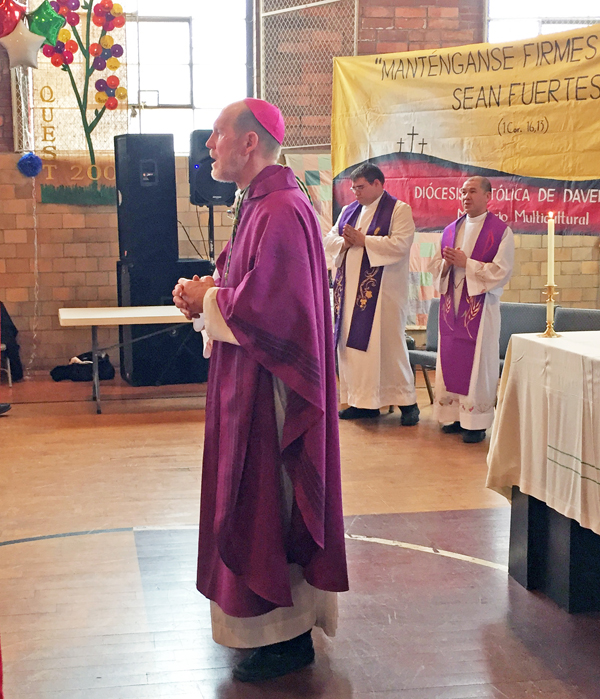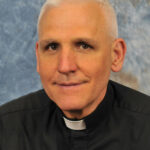Dear Sisters and Brothers in Christ:
On Aug. 20, 2018, the Holy Father sent a letter to the whole People of God. “With shame and repentance” he acknowledged the failings of the church in light of the new revelations of sexual abuse and misuse of power by clergy in Pennsylvania, and at the highest levels of the hierarchy.

Bishop Thomas Zinkula gives a homily to members of the Hispanic community during a Mass at St. Vincent Center earlier this year.
Acknowledging the efforts that have been made to address this crisis, he went on to say that “[t]ogether with those efforts, every one of the baptized should feel involved in the ecclesial and social change that we so greatly need. This change calls for a personal and communal conversion that makes us see things as the Lord does.”
In other words, Pope Francis is telling us that truth is the first step of healing. And he is calling us to a deeper solidarity with those who have suffered abuse at the hands of the church; to truly “see” them and their suffering; to not turn a blind eye. So, how do we open our eyes and hearts? The pope calls us to the time-honored disciplines of prayer and penance. Such is the path to holiness.
In that light, I am joining with the Holy Father in calling all of us to devote ourselves to prayer and penance in a particular way on the Fridays of September.
Prayer
I encourage families, groups of the faithful, and parishes to set aside time for prayer: for the healing of the victims of abuse, in reparation for the sins of omission and commission that have led to this crisis, for our own conversion. Some suggestions might include:
• The Liturgy of the Hours, especially Evening Prayer, when we pray the Magnificat, and are reminded (as Pope Francis notes) that “Mary’s song is not mistaken and continues quietly to echo throughout history. For the Lord remembers the promise he made to our fathers: ‘he has scattered the proud in their conceit; he has cast down the mighty from their thrones and lifted up the lowly; he has filled the hungry with good things, and the rich he has sent away empty’ (Lk 1:51-53). We feel shame when we realize that our style of life has denied, and continues to deny, the words we recite.”
• The Stations of the Cross, especially on Sept. 14.
• The rosary, focusing on the Sorrowful Mysteries.
•A Holy Hour before the Blessed Sacrament.
Sept. 14 is the Feast of the Exaltation of the Holy Cross; Sept. 21 is the Feast of St. Matthew. Those Masses should be celebrated as prescribed. On Sept. 7 and 28, however, I ask that parishes celebrate the Mass for the Forgiveness of Sins, #38 from the Masses and Prayers for Various Needs and Occasions. Purple vestments are to be worn. The readings (Lectionary Volume IV) are to be:
Sept 7: Rom 6:2-14 [949 #1] Psalm 51 [950 #1] Mark 1:1-8, 14-15 [952 #2]
Sept 28: 1 John 1:2-2:2 [949 #2] Psalm 130 [950 #3] Luke 7:36-50 [952 #3]
Fasting
Pope Francis reminds us that fasting opens our hearts to the suffering of others; it helps us grow in our solidarity with them. Our fasting can take many forms. Abstaining from meat, or fasting from food as we do on Ash Wednesday and Good Friday, are appropriate disciplines. Or we may choose to fast from practices that might distract us from the suffering of others, such as electronic media or other forms of entertainment. There are many possibilities. The key is to choose something that will help remind us of those who have suffered abuse at the hands of the church.
Almsgiving
The third traditional penitential practice is almsgiving. During Lent, for example, many of us take part in Catholic Relief Service’s Rice Bowl program. Perhaps we might, at this time, choose to donate to or volunteer with ministries or community organizations that care for victims of sexual and physical abuse; for example, a domestic violence shelter or counseling service.
Just the Beginning
Naming, and condemning, the sins of sexual abuse, of the abuse of power, of clericalism is essential. Holding perpetrators and those who looked the other way to account is essential. But these are not enough. We are called to solidarity and to a deeper holiness.
Solidarity with victims of abuse requires us to make sure that we do everything in our power, as individuals and institutions, to protect the most vulnerable in our communities. Prayer, fasting and almsgiving are a start, and the constant foundation from which we will need to build. So, while I am calling us to a particular observance of these disciplines on the Fridays of September, our efforts should not stop there.
In the end, this is a matter of holiness. Our labors must be ongoing, and solidly rooted in the person and example of Jesus Christ and the power of the Holy Spirit. Otherwise, we simply build on sand.
Bishop Thomas Zinkula











